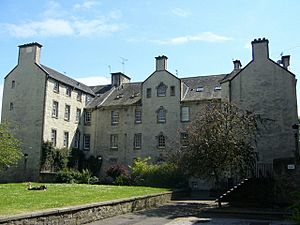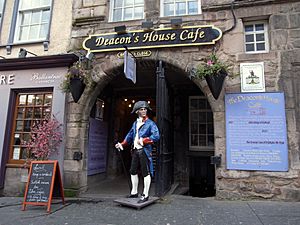William Brodie facts for kids
Quick facts for kids
William Brodie
|
|
|---|---|

1788 Plate Illustration of William Brodie
|
|
| Born | 28 September 1741 Edinburgh, Scotland
|
| Died | 1 October 1788 (aged 47) Edinburgh, Scotland
|
| Resting place | St. Cuthbert's Chapel of Ease, Edinburgh |
| Other names | Deacon Brodie |
| Occupation | Locksmith, Councillor |
| Known for | Housebreaking |
| Children | 5 |
| Criminal charge | Robbery |
| Penalty | Hanging |
William Brodie (born September 28, 1741 – died October 1, 1788) was a well-known person in Edinburgh, Scotland. He was often called Deacon Brodie. By day, he was a respected cabinet-maker and a leader in his trade. He was even a city councillor, helping to run Edinburgh.
However, Brodie had a big secret. At night, he lived a completely different life as a housebreaker, which means he broke into houses to steal. He did this partly for excitement and partly to pay for his gambling.
Contents
Brodie's Two Lives
William Brodie was the son of Francis Brodie, an important person in Edinburgh's trades. Because of his father's position, William became the Deacon of the Wrights and Masons around 1781. A Deacon was like a president or leader of a group of skilled workers.
Brodie's family lived in a house on Brodie's Close in Edinburgh. This area was known for skilled workers like "wrights," who were people who worked with wood, like cabinet-makers.
Daytime: A Respected Citizen
During the day, Brodie was a very respected tradesman. As the Deacon of the Wrights, he was in charge of cabinet-making in Edinburgh. This important role also made him a member of the city council.
Part of his job was to install and fix locks and other security systems. He spent time with important people in Edinburgh, like the famous poet Robert Burns.
Nighttime: A Secret Thief
But when night came, Brodie changed. He used his daytime job to help him steal. When he worked in people's homes, he would learn about their security. He even made copies of their keys using wax.
Since he was the best locksmith in the city, he worked in the homes of many rich people. He used the money he stole to support his secret life. This included a gambling habit and caring for his five children.
Brodie started his criminal life around 1768. He reportedly copied keys to a bank and stole a large sum of money. In 1786, he formed a gang with three other thieves: John Brown, George Smith, and Andrew Ainslie.
Capture and Trial
Brodie's secret life began to fall apart on March 5, 1788. He planned a robbery at the excise office in Chessels Court. An excise office was where taxes were collected. He had already copied the key to the door.
Brodie and his gang, Smith, Ainslie, and Brown, went to the office around 8 PM. They were dressed in black. Their plan was interrupted when someone returned to the office unexpectedly. The gang only managed to steal a small amount of money.
The Chase Begins
After the robbery, one of Brodie's gang members, John Brown, went to the authorities. He wanted a King's Pardon for a past crime. To get it, he told the authorities about Smith and Ainslie. He also showed them a hidden collection of copied keys.
Smith and Ainslie were arrested. Brodie tried to visit them in prison but was not allowed. Realizing he was in danger, Brodie quickly left Edinburgh. He traveled south, trying to escape.
A King's Messenger named George Williamson chased after him. Brodie eventually made his way to the Netherlands, hoping to escape to the United States. However, he had given some letters to a man on the boat. This man became suspicious and gave the letters to the authorities in Edinburgh.
Williamson continued his chase and found Brodie in Amsterdam. Brodie was then brought back to Edinburgh to face trial.
The Trial and Outcome
Brodie's trial began on August 27, 1788. At first, there wasn't much direct proof against him. But the police found tools for stealing in his house, like copied keys and pistols.
Then, John Brown and Andrew Ainslie agreed to tell the court what they knew in exchange for a lighter sentence. This is called "turning King's Evidence." Their statements, along with the letters Brodie wrote while on the run, convinced the jury. Brodie and Smith were found guilty.
William Brodie and George Smith were executed on October 1, 1788. A huge crowd of about 40,000 people watched. One story says that Brodie tried to prevent his death by wearing a steel collar and a silver tube. It was rumored he had bribed the hangman and hoped to be revived later. However, if this was his plan, it did not work.
Brodie was buried in an unmarked grave in Edinburgh. But rumors continued that he had been seen alive in Paris, adding to the mystery of his story.
|



